CanLII Canada – A Guide To Prepare A Solid Immigration Case
The Canadian Legal Information Institute is called CanLII Canada. The Federation of Law Societies of Canada oversees CanLII, a non-profit company. This non-profit institution aims to make Canadian law freely available online. Access to court rulings, tribunal decisions, statutes, and regulations from every Canadian jurisdiction is public on the website.
Who is CanLII Canada?
CanLII Canada was founded and is paid for by the Canadian lawyers and notaries who comprise the Federation of Law Societies of Canada. On behalf of its 14-member law societies, the Federation of Law Societies of Canada established CanLII as a non-profit entity in 2001. Its responsibility is to make judicial rulings and legislative texts easily and freely accessible online. By doing this, The Canadian Legal Information Institute assists lawyers in carrying out their duties while access free public court records Canada to all Canadian laws and court rulings.
What Does The Canadian Legal System Do?
CanLII Canada is a signatory to the Montreal Declaration on Free Access to Law and a founding member of the Free Access to Law Movement. It has started by Lexum to publish law online in 1993 as a legal informatics lab at Université de Montréal, beginning with the Supreme Court of Canada’s decisions. In March 2018, The Canadian Legal Information Institute acquired the shares of Lexum. This tool allows users to search the electronic records of Court files by the person’s name, the Corporation’s name, the Court File Number, and Related Cases.
What Will You Find On CanLII?
Since 2000, all Canadian courts, including the Supreme Court of Canada, federal courts, and courts in Canada’s provinces and territories, have provided free public court records Canada (Legal Cases). Most Canadian courts have a collection of these “organically acquired” cases spanning more than 18 years.
To provide a comprehensive resource for jurisprudence for access to Canadian law, CanLII has also finished several projects to add historical cases, that is, cases from before 2001.
Why Accessing To Previous Courts Cases?
The primary reason why reading the previous court cases is useful is to prepare a solid Canadian Immigration application that fully addresses the concerns of the IRCC officer by consulting related immigration cases dissolved at IRB or Federal Court. So, doing so, give you a recourse if your application will be refused by IRCC Canada. Then, you might seek an assistant of a Canadian lawyer or RCIC who has won many similar cases and who can do the same for you.
What are persuasive decisions, and who should utilize them?
Immigration lawyers or RCICs may identify a decision as persuasive if they believe it will help advance the jurisprudence of their cases. These judgements are effectively written and analyze all the pertinent problems in a case. They also include clear, thorough, and concise justifications for the specific element that is thought to have persuasive value.
Canadian lawyers and RCICs are encouraged to rely on effective decisions to maintain consistency and make effective judgements. When necessary, this consistency may also support early resolution without a hearing by assisting parties and counsel in their preparation for hearings before the IRB or federal court.
The IRB, IRCC, Canadian Lawyers, and RCICs can advance toward a transparent, consistent application of the law by using effective decisions. By utilizing excellent work produced by peers, their designation encourages efficiency in the hearing and reasoning writing processes.
Where can I look for a court case?
Method 1: Finding a Court decision if you know its court name, or decision's citation
If you know which court made the decision you’re looking for, go to that court’s presentation page (For foreign nationals whose TRV applications have been refused by the IRCC officer, it is Federal court). This is especially important if the decision was just made because it can be included under recently rendered decisions, and you can obtain it directly from there. A search template on the court’s presentation page makes it simple to locate the judgment using the data you already have.
If you know the decision’s citation, you can put it in field 2 of the search form as either a CanLII citation, a neutral citation, or a citation to a law report supported by RefLex. For instance, you should start by entering only the citation without the case name or “style of cause” to obtain the judgement in McMahon v. Canada (Attorney General), 2005FCA33, 2005FCA33. Enter only the keywords—mcmahon Canada—if you know the case name. Only key terms should be entered because some case names may differ from one publisher to the next.
Other information or a mix of facts can also be used to decide. If you know their names, you can conduct a full-text search by entering the name of a party, judge, or attorney engaged in the case in field one. Field 2 can be used to enter the docket number, and field 3 can be used to provide the date or time the decision was made.
Method 2: Finding a Court decision without knowing its court name, or decision's citation?
1- Deciding on your keywords
You must utilize the full-text search in field 1 and input terms or combinations of words likely to appear in pertinent decisions if you’re seeking decisions that address a particular legal issue or factual situation.
We want to help you perform a basic search to find Canadian Immigration cases using the CanLII Canada database. We can offer different options to search for information. Still, because you don’t know the specific case’s name, you can enter your keywords into the “Document text” box to learn more about combining search terms.
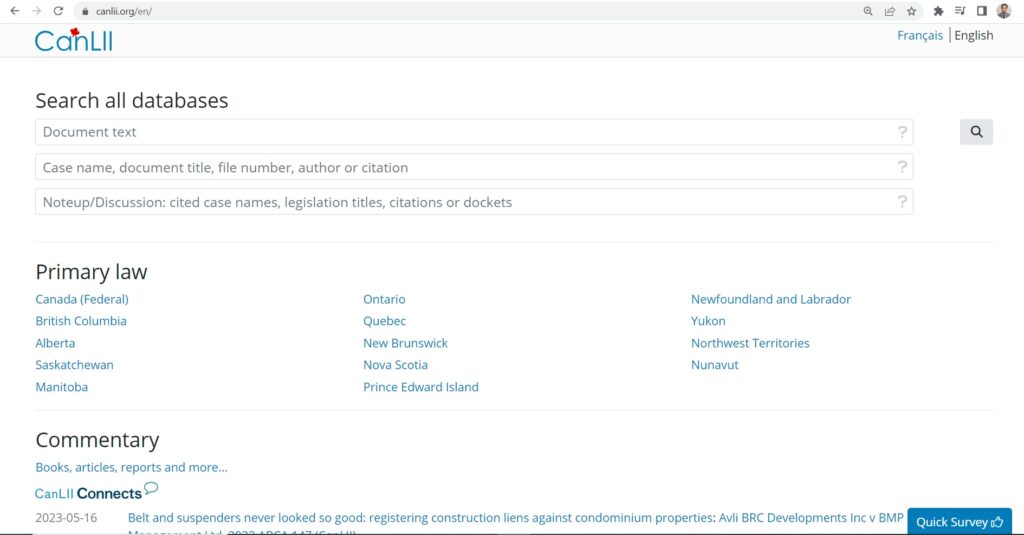
2- Enter keywords (Example: STUDENT VISA) into the "Document text" box to learn more about combining search terms
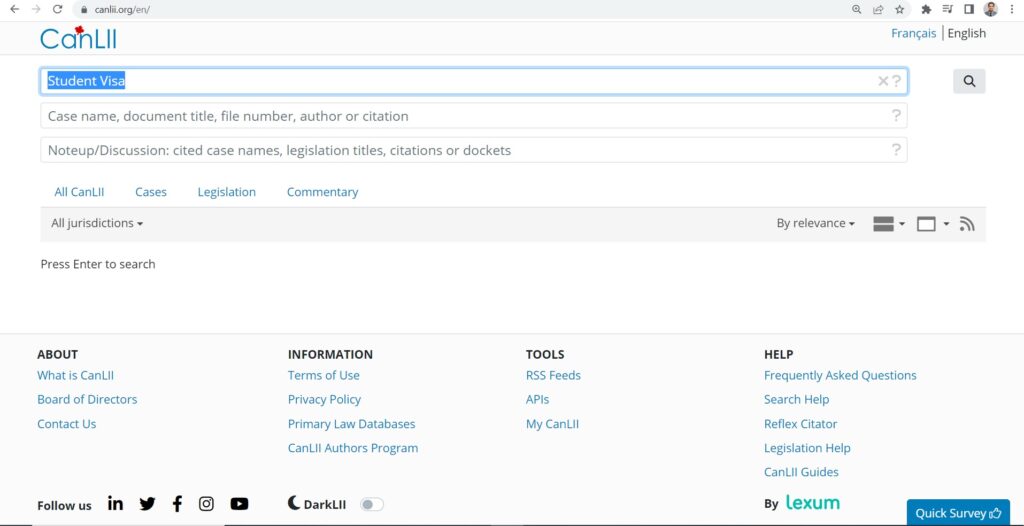
3- Evaluate your results (8,777 Cases were found)
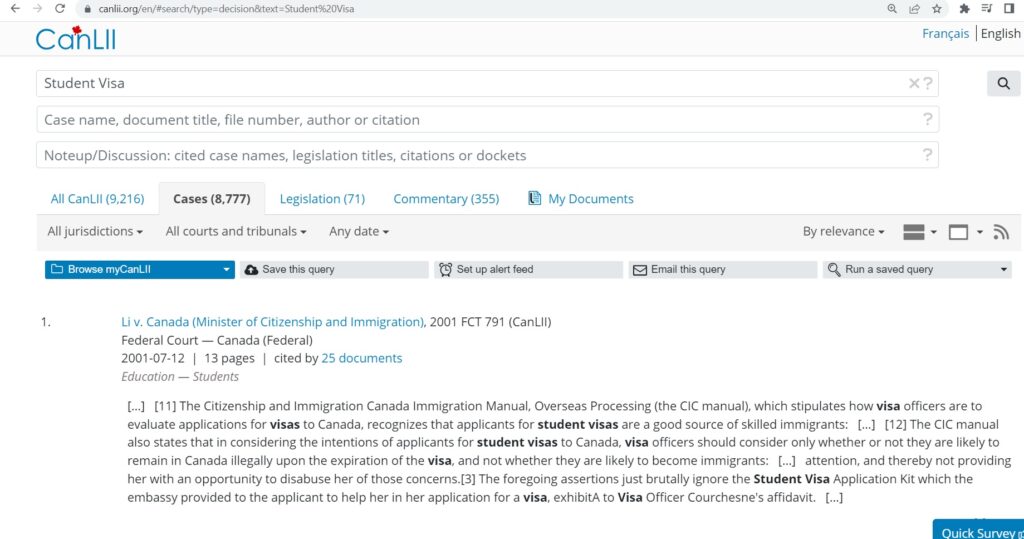
4- Narrow your search to get better results by choosing a date to see the full text of the specific case.
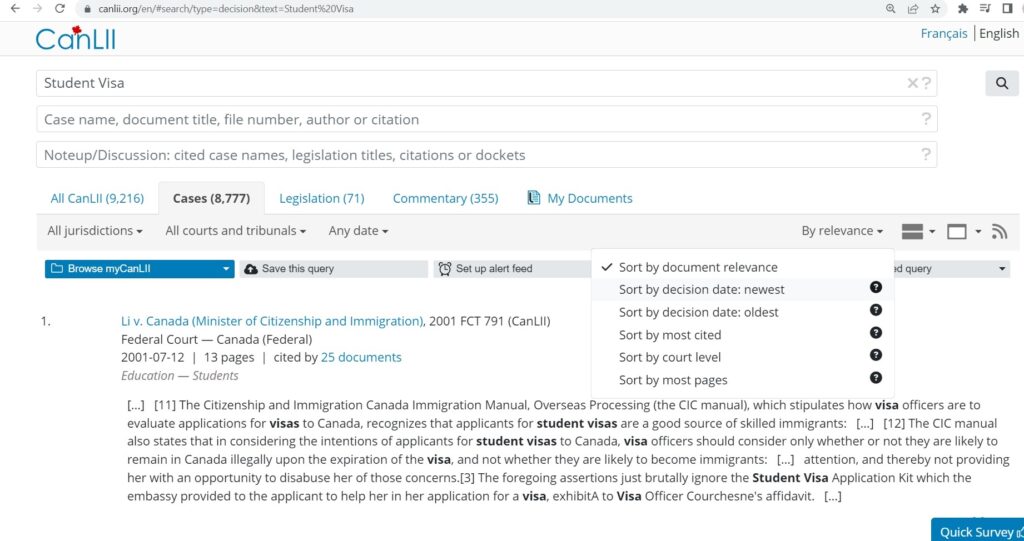
5- Clicking on a jurisdiction choosing a particular court or Tribunal to see the full text of the specific case.
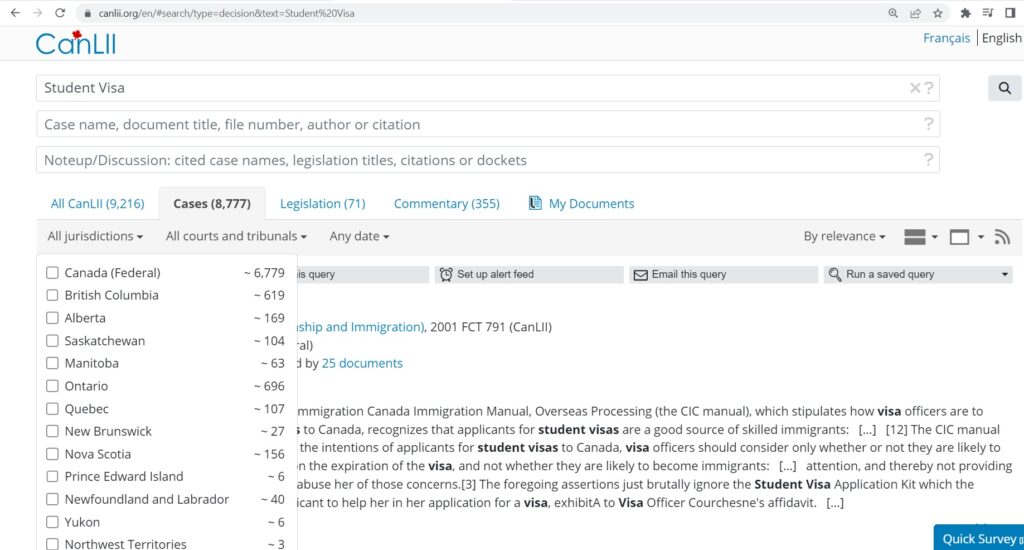
6- Add another term to your search box (PERMIT), As as there are too many results for you to search
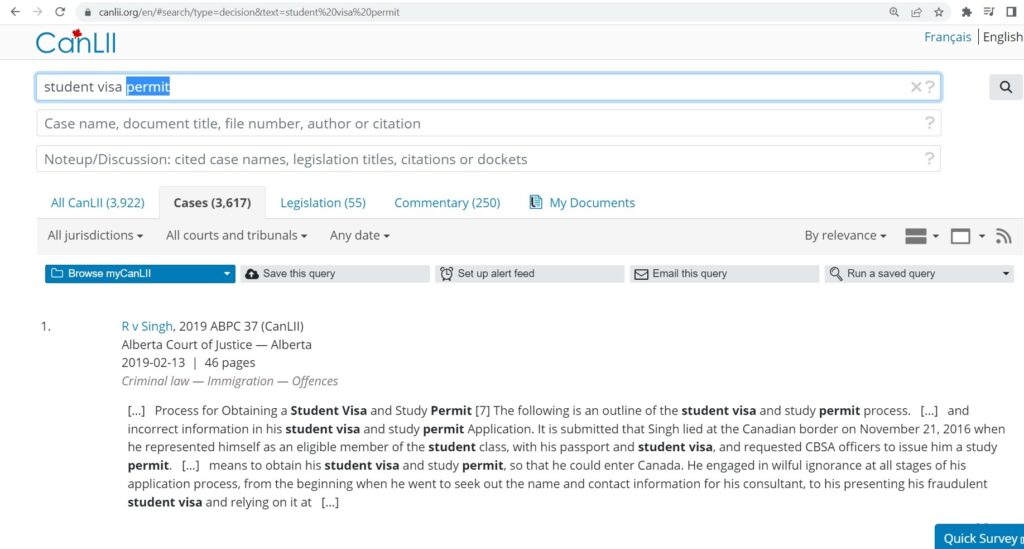
7- Find your case to Print or Email
All our results are listed by relevance. You can click the title to print this case off or email it using the links on the right side of the screen. As we browse our case, you’ll notice that each of your terms (Student Visa Permit) has also been highlighted. There are links to other cases and legislation that might be irrelevant to our topic; to return to our list we click the back arrow. After reading a few headnotes, you might discover that the outcomes differ from what you hoped. You can change your search keywords at this moment.
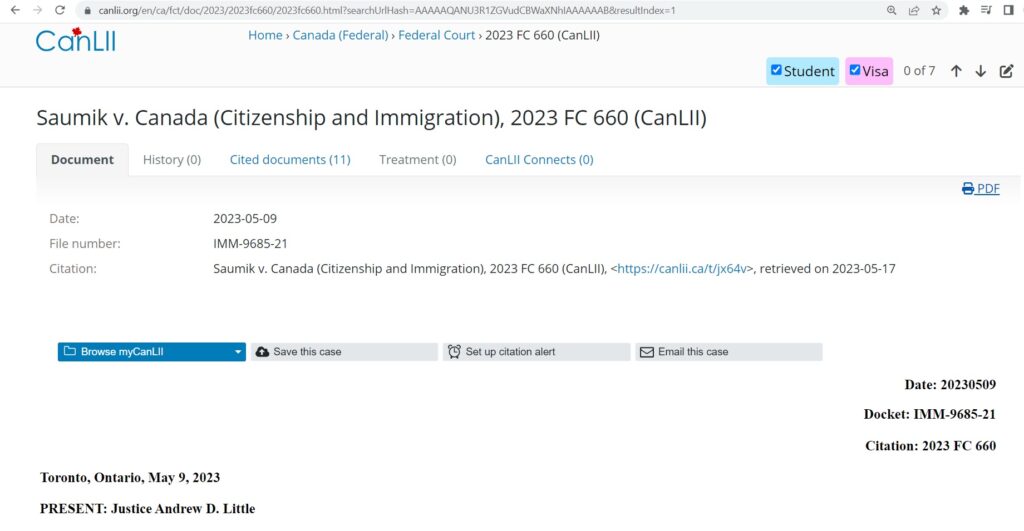
Essential skills to get a better result for your inquiry
1. Become familiar with advanced search methods
The CanLII Canada search bar’s input field will affect the outcomes you receive. You can get the precise results you need with the aid of search engine operators. For instance, you can conduct a search engine to find all the words by adding “AND” between your keywords. Using quotation marks (“”) means looking for precise wording
2. Read the headnote (the heading):
Some instances can go on for a while. Reading through all the cases will take too long to look for pertinent ones. Wouldn’t reading a brief overview of each case be more pleasant? The majority of cases on CanLII Canada include these summaries. Headnotes are what they are known as, and they typically come before the actual decision. You should read the complete ruling if you determine the case is pertinent based on the headnote.
3. Arrow keys:
To move through cases without headnotes, you should utilize the keyword arrow keys at the top of the window. Read the sections of the cases next to the keywords using the arrow keys.
4. Limit results by jurisdiction and court level
Jurisdiction and court level are important considerations when looking for legally binding case law. Under the “Cases” tab, you can filter your search results.
CanLII Canada FAQs
Typically, no. Information presented in court trials is public knowledge in Canada. The law occasionally establishes exceptions to this rule by placing various long-term or short-term constraints on disclosing information through either legislative provisions or judicial orders. With the assistance of the courts and other organizations that furnish decisions, CanLII adheres meticulously to such legislative limits.
Requests regarding the content of papers posted on the CanLII website should be made via the feedback form and sent to the editor of CanLII. Requests for the withdrawal or redaction of decisions shall be examined considering any rules governing publication limits. Your request must be supported by applicable legal restrictions or a court order limiting publication to be allowed. If you want to submit a withdrawal request but are still determining the legal requirements for your circumstance, you should first speak with a lawyer or the court or tribunal’s registry.
CanLII does not permit external web robots to index decisions posted on its website to lessen the impact of decision publication on people’s privacy. This stops users from deciding on CanLII by using an available search engine to search for a person’s name. However, names on this page or in the link’s content may still be indexed by external search engines when a third-party links to a CanLII decision on a website that is not within CanLII’s control. The technological and statutory safeguards to prevent external indexing are not represented or guaranteed to be upheld, error-free, or reliable by CanLII or its partners.
No, CanLII Canada doesn’t prioritize decisions based on their importance or content. All written judgements disseminated by courts and tribunals will eventually be posted on CanLII. Nevertheless, many oral rulings will never be published in writing. This frequently occurs, for instance, when a jury renders judgment decisions without providing written justification in some criminal examples. Please keep in mind that CanLII complies with existing regulations on publishing limits and, as a result, may delay the release of some decisions to honour temporary publication bans.
Hearings before the IRB or Federal Court are typically open to the public under the Immigration and Refugee Protection Act. When there is a significant chance that a person’s life, liberty, or security may be at risk if the proceeding is held publicly or for grounds of justice or public safety, as described in section 166 of the Act, a case may be heard in private.
Judgment and justifications are “sanitised” when a matter is heard secretly. In other words, “XXX” is substituted for any information that could be used to identify the individual who is the subject of the proceedings.
Recent judgements are typically posted on the website two working days after they are sent to CanLII Canada by the court or tribunal that issued and received them. However, delays may occasionally be due to publication-related processing issues or legal limitations.
How Arnika Visa Can Help?
Depending on the type of application, the refusal may be appealed at either the Immigration and Refugee Board (IRB) or the Federal Court of Canada (FC). Each tribunal has its own set of norms and procedural regulations. Only some cases need to be considered by a judge or appeal. Our RCIC will evaluate your immigration application decision made by the IRCC Officer and give you our legal advice if you want to appeal or seek judicial review of a wrong decision.



